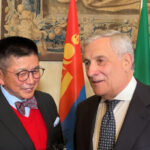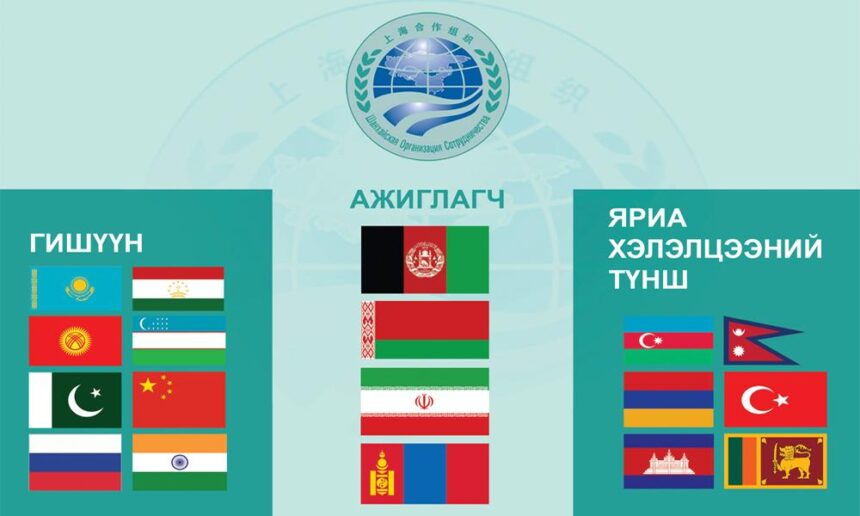On June 14, 2019, during the traditional trilateral meeting of the state heads of Russia, Mongolia, and China, which took place after the SCO meeting in Bishkek, the President of the People’s Republic of China, Xi Jinping, said “If Mongolia joins the organization, it will also make the most of its advantages, play a major part in SCO cooperation and derive substantial benefits. The sooner a decision on Mongolia’s accession to the SCO is adopted, the more opportunities it will enjoy to benefit from this cooperation and make progress as a nation.”
The President of our largest trading partner, importing almost all Mongolian export products and on whom we depend economically, emphasized the significance of the SCO. Therefore, it is necessary for Mongolians to clarify, firstly, what type of organization it is, and secondly, to evaluate the advantages and benefits of a membership.
SCO
The SCO is the world’s largest regional organization covering two fifths of the Eurasian continent and accounting nearly half of the world’s population. Moreover, it consists of powerful member states in terms of economy, politics, military, and natural resources.
Since 2004, Mongolian officials regularly participated in the Council of the Heads of State of the SCO meetings with an observer status. It was in June 2018 at the meeting of the SCO held in Qingdao that the President of Mongolia Kh.Battulga first announced his desire to join the SCO as full member in order to permanently participate in regional cooperation. Ever since, the accession to the SCO is a burning issue.
In 1996, the heads of Russia, China, Kazakhstan, Kyrgyzstan, and Tajikistan established the Shanghai Five by signing the “The Treaty on Deepening Military Trust in Border Regions”. In 2001, the group renamed itself the SCO when Uzbekistan joined the group. However, the SCO officially began its operations not before heads of the member states signed the SCO Charter in 2002. Lately, in 2017, India and Pakistan officially joined the SCO as full members.
Chart 1. The member, observer, and dialogue partner countries of SCO (as of 2019)

The SCO’s main goal is to ensure the regional security particularly by combating terrorism, separatism, and extremism. In addition, pursuant to the member states’ initiative, the SCO set up a plan to expand its operation into politics, trade, economy, research, technology, culture, education, energy, transport, tourism, and environmental protection. Despite that, the cooperation in areas other than security and politics remain underdeveloped.
The RATS (The Regional Anti-Terrorist Structure), headquartered in Tashkent, creates a database of terrorist organizations. By 2017, 600 terrorist attempts were halted, 50 tonnes of drugs and 10,000 small firearms were seized.
Over the last years, China has been making constant efforts to expand the economic cooperation of the SCO members. Under ‘One Road One Belt’ initiative, project loans amounting US$49.6 billion by the end of March 2019 were granted to members, observer states, and dialogue partners of the SCO from the China Development Bank. In 2014, the China-SCO Environmental Cooperation Center was created to facilitate cooperation in environmental protection and green development of member states. Furthermore, China begun building the demonstration area of the SCO’s regional trade and logistics from July, 2019.
ACTUAL BENEFIT
President Kh.Battulga stated at the latest SCO meeting held in Bishkek in June, 2019 “Currently, Mongolia is examining opportunities for taking participation in the SCO to the next level […] In Mongolia, the national public opinion is divided over accession to the SCO” . Indeed, Mongolian citizens are divided over the issue.
The MIRIM Consultant LLC’s survey shows that Mongolians are evenly divided over joining the SCO. Those in favor of the accession considered that the SCO might positively impact Mongolian economy. Whereas the other half, on the contrary, expressed that firstly, Mongolia might become overly dependent on our two neighbors and secondly, it might negatively affect national security.
- With regard to Mongolian researchers, some argue from an economic perspective that at the present moment, no activities are taking place which are beneficial to Mongolia, hence the accession would not be an urgent matter. For twenty years the SCO has been striving to expand its economic cooperation, especially in sectors of trade, energy, transport, tourism, yet so far, no large scale projects were executed. It might be an indication of the SCO’s internal conflict. China tends to put more weight on economy, but Russia on security. On the other hand, Russia is not prepared to admit free movement of Chinese cheap goods to its territory. Furthermore, scholars pointed out India’s opposition to the view that the SCO is a continuation of China’s “One Belt One Road”.
- Few scholars argue from a political stand-point that the SCO, dominated by Russia and China, is directed against the US. This is largely due to the fact that the US’s application for gaining an observer status in the SCO was rejected. Majority of the SCO members have border disputes and are still caught up in negotiations unable to settle the dispute. The ongoing Kashmir conflict clearly shows the severity of the conflicts. Consequently, these scholars strongly advice against entangling ourselves in the SCO when Mongolia does not have any territorial or border disputes.
- The third group of scholars emphasizes the following: Mongolians incorrectly suspect that the SCO is making decisions on our behalf and we are being left out of the regional mechanism. However, the construction of a transit corridor between our two neighbors, roads and rails, gas and oil pipelines, power and communication cables have been in discussion for a while but not been executed. Moreover, Mongolia became a strategic partner to both our neighboring countries. In fact, the accession to the SCO was suggested because it is more beneficial for our third neighbor policy.
The position on Mongolia’s accession to the SCO varies among both scholars and public. Nonetheless, a vast majority of decision makers in public bodies are inclined to argue against a rushed accession.
Prior to making any decision on this matter, extensive discussions must precede on multiple levels in order to evaluate this endeavor from various angles. Furthermore, another way to decide is to hold a national referendum on the accession after providing sufficient information on the SCO to the public. Meanwhile, we need to make most out of bilateral or trilateral cooperation with our neighbors in areas of economy, environment, and the fight against drugs. Simultaneously we should not disregard, all the opportunities of observer states, cooperate in all areas, and assist our workforce in acquiring education and experience.
2019.08.21
Trans. by Riya.T and Ariunzaya.M












